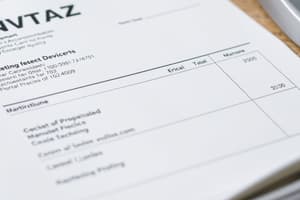Podcast
Questions and Answers
What is the frequency with which a taxpayer under the composition scheme must file their tax returns?
What is the frequency with which a taxpayer under the composition scheme must file their tax returns?
- Annually
- Monthly
- Quarterly (correct)
- Biannually
Which of the following is the correct tax rate for an eligible manufacturer under the composition levy?
Which of the following is the correct tax rate for an eligible manufacturer under the composition levy?
- 5%
- 1% (correct)
- 2%
- 6%
What type of return must a taxpayer under the composition scheme file?
What type of return must a taxpayer under the composition scheme file?
- Simple annual return in FORM GSTR-4 (correct)
- Annual return in FORM GSTR-9
- Quarterly return in FORM GSTR-1
- Monthly return in FORM GSTR-3
Which category of suppliers is required to pay 6% under the composition levy?
Which category of suppliers is required to pay 6% under the composition levy?
What legal provision outlines the composition levy for taxpayers?
What legal provision outlines the composition levy for taxpayers?
What is prohibited for an unregistered person regarding tax collection?
What is prohibited for an unregistered person regarding tax collection?
What must a registered person do when indicating the amount of tax in documents?
What must a registered person do when indicating the amount of tax in documents?
For how long must a registered person retain their books of account?
For how long must a registered person retain their books of account?
Which section provides for the issuance of credit notes and debit notes?
Which section provides for the issuance of credit notes and debit notes?
What does Section 37 address concerning registered persons?
What does Section 37 address concerning registered persons?
What responsibility is cast on warehouse operators according to Section 35?
What responsibility is cast on warehouse operators according to Section 35?
What requirement does Section 38 impose on registered persons regarding inward supplies?
What requirement does Section 38 impose on registered persons regarding inward supplies?
What is a primary focus of Section 39 concerning registered persons?
What is a primary focus of Section 39 concerning registered persons?
What is the timeframe within which the Proper Officer must cancel the registration after receiving an application?
What is the timeframe within which the Proper Officer must cancel the registration after receiving an application?
When does the registration of a person become suspended after applying for cancellation?
When does the registration of a person become suspended after applying for cancellation?
Under which condition may the Proper Officer suspend a person's registration?
Under which condition may the Proper Officer suspend a person's registration?
What must a registered person do if their registration is suspended due to discrepancies?
What must a registered person do if their registration is suspended due to discrepancies?
What restrictions apply to a registered person whose registration has been suspended?
What restrictions apply to a registered person whose registration has been suspended?
Which FORM is used to communicate the suspension of a registered person's registration?
Which FORM is used to communicate the suspension of a registered person's registration?
What happens when significant anomalies are found in a registered person's returns?
What happens when significant anomalies are found in a registered person's returns?
What is the consequence for a registered person regarding their taxable supply if their registration is suspended?
What is the consequence for a registered person regarding their taxable supply if their registration is suspended?
What supplies are included in the value of exempt supply under sub-section (2)?
What supplies are included in the value of exempt supply under sub-section (2)?
Which of the following activities is not included in the value of exempt supply?
Which of the following activities is not included in the value of exempt supply?
What option does a banking company have regarding input tax credit?
What option does a banking company have regarding input tax credit?
What happens to the option once it is exercised by a banking company for input tax credit?
What happens to the option once it is exercised by a banking company for input tax credit?
Which scenario is exempt from the restriction of fifty percent input tax credit for banking companies?
Which scenario is exempt from the restriction of fifty percent input tax credit for banking companies?
What is one of the consequences of collecting tax from customers but not paying it to the government?
What is one of the consequences of collecting tax from customers but not paying it to the government?
Which section of the CGST Act defines various terms and expressions used in the Act?
Which section of the CGST Act defines various terms and expressions used in the Act?
What happens when there is non-reversal of Input Tax Credit under Rule 42 and 43?
What happens when there is non-reversal of Input Tax Credit under Rule 42 and 43?
Which section provides the scope of supply under the CGST Act?
Which section provides the scope of supply under the CGST Act?
What does the Reverse Charge Mechanism liability refer to?
What does the Reverse Charge Mechanism liability refer to?
Which section deals with the powers assigned to officers under the CGST Act?
Which section deals with the powers assigned to officers under the CGST Act?
What is an implication of wrong classification of goods/services under GST?
What is an implication of wrong classification of goods/services under GST?
Which activity is considered a supply even if made without consideration?
Which activity is considered a supply even if made without consideration?
Flashcards are hidden until you start studying
Study Notes
Issuance of Documents
- Documentation requirements exist for situations other than tax invoices.
- Unregistered persons are prohibited from collecting tax.
- Registered persons must collect tax according to the Act's provisions.
Tax Indication Requirements
- Any consideration-related supply must clearly show tax amounts in all relevant documents.
- Sections related to credit and debit notes are outlined, detailing issuance and reporting requirements.
Record Keeping and Retention
- Registered persons must maintain accurate records of specified particulars at their primary business location.
- Responsibilities for maintaining records extend to warehouse operators and transporters.
- Records must be retained for 72 months post the due date of submitting the annual return.
Outward and Inward Supplies
- Specifics on the timing and manner of filing details for outward and inward supplies are provided, with reference to receipt communication.
- Rectification of unmatched details involving error corrections and payment of tax may apply.
Return Filing
- Regulations detail how different categories of registered persons must file returns.
- Cancellation of registration involves a process where the Proper Officer must act within 30 days upon application.
Registration Suspension
- Suspended registration occurs upon application for cancellation or by decision of the Proper Officer due to inconsistencies found in returns.
- A suspended registered person is barred from making taxable supplies or issuing tax invoices and is exempt from filing returns.
Composition Levy
- Section 10 of the CGST Act allows for a composition levy to simplify tax liabilities for eligible taxpayers.
- Different tax rates apply to manufacturers, service providers, and traders with specified percentages.
Tax Rates
- Eligible manufacturers pay 1% of their turnover.
- Service providers and suppliers (excluding restaurants) are taxed at 6%.
- Restaurant service providers are taxed at 5%.
- Traders also pay a tax rate of 1%.
Exemptions and Reverse Charge
- Exempt supplies include those for which recipients are liable to pay tax via reverse charge or transactions like land sales.
- Banking institutions have options for tax credit compliance under specific provisions.
Common Non-compliance Issues
- Non-payment or short payment of tax can stem from wrong classifications or improper calculations.
- Issues include incorrect tax collection, ineligible input tax credit claims, and failure to reverse input tax credits.
GST Audit
- GST audits serve to reconcile tax liability, ensure compliance with GST laws, and educate taxpayers on legal obligations.
CGST Act Provisions
- Defines terms and outlines the structures for operation, including appointment and powers of officers.
- Scope and definitions of supply, tax liability on composite or mixed supplies, and exceptions to the Act are covered.
Studying That Suits You
Use AI to generate personalized quizzes and flashcards to suit your learning preferences.



